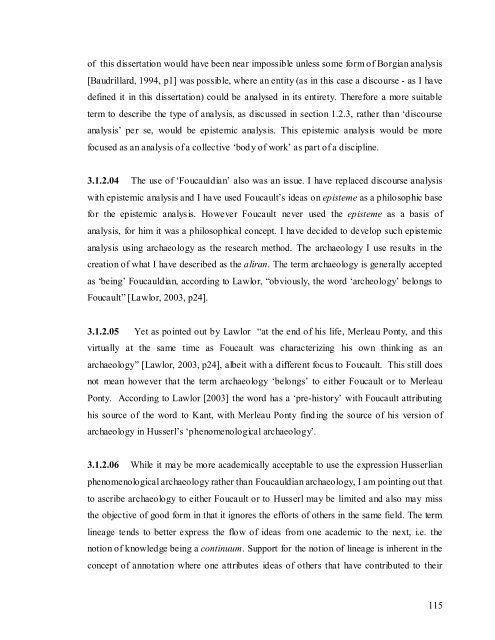Mapping the aliran of the academic discipline of entrepreneurship: A ...
Mapping the aliran of the academic discipline of entrepreneurship: A ...
Mapping the aliran of the academic discipline of entrepreneurship: A ...
You also want an ePaper? Increase the reach of your titles
YUMPU automatically turns print PDFs into web optimized ePapers that Google loves.
<strong>of</strong> this dissertation would have been near impossible unless some form <strong>of</strong> Borgian analysis<br />
[Baudrillard, 1994, p1] was possible, where an entity (as in this case a discourse - as I have<br />
defined it in this dissertation) could be analysed in its entirety. Therefore a more suitable<br />
term to describe <strong>the</strong> type <strong>of</strong> analysis, as discussed in section 1.2.3, ra<strong>the</strong>r than ‘discourse<br />
analysis’ per se, would be epistemic analysis. This epistemic analysis would be more<br />
focused as an analysis <strong>of</strong> a collective ‘bod y <strong>of</strong> work’ as part <strong>of</strong> a <strong>discipline</strong>.<br />
3.1.2.04 The use <strong>of</strong> ‘Foucauldian’ also was an issue. I have replaced discourse analysis<br />
with epistemic analysis and I have used Foucault’s ideas on episteme as a philosophic base<br />
for <strong>the</strong> epistemic analys is. However Foucault never used <strong>the</strong> episteme as a basis <strong>of</strong><br />
analysis, for him it was a philosophical concept. I have decided to develop such epistemic<br />
analysis using archaeology as <strong>the</strong> research method. The archaeology I use results in <strong>the</strong><br />
creation <strong>of</strong> what I have described as <strong>the</strong> <strong>aliran</strong>. The term archaeology is generally accepted<br />
as ‘being’ Foucauldian, according to Lawlor, “obviously, <strong>the</strong> word ‘archeology’ belongs to<br />
Foucault” [Lawlor, 2003, p24].<br />
3.1.2.05 Yet as pointed out by Lawlor “at <strong>the</strong> end <strong>of</strong> his life, Merleau Ponty, and this<br />
virtually at <strong>the</strong> same time as Foucault was characterizing his own thinking as an<br />
archaeology” [Lawlor, 2003, p24], albeit with a different focus to Foucault. This still does<br />
not mean however that <strong>the</strong> term archaeology ‘belongs’ to ei<strong>the</strong>r Foucault or to Merleau<br />
Ponty. According to Lawlor [2003] <strong>the</strong> word has a ‘pre-history’ with Foucault attributing<br />
his source <strong>of</strong> <strong>the</strong> word to Kant, with Merleau Ponty find ing <strong>the</strong> source <strong>of</strong> his version <strong>of</strong><br />
archaeology in Husserl’s ‘phenomenological archaeology’.<br />
3.1.2.06 While it may be more <strong>academic</strong>ally acceptable to use <strong>the</strong> expression Husserlian<br />
phenomenological archaeology ra<strong>the</strong>r than Foucauldian archaeology, I am pointing out that<br />
to ascribe archaeology to ei<strong>the</strong>r Foucault or to Husserl may be limited and also may miss<br />
<strong>the</strong> objective <strong>of</strong> good form in that it ignores <strong>the</strong> efforts <strong>of</strong> o<strong>the</strong>rs in <strong>the</strong> same field. The term<br />
lineage tends to better express <strong>the</strong> flow <strong>of</strong> ideas from one <strong>academic</strong> to <strong>the</strong> next, i.e. <strong>the</strong><br />
notion <strong>of</strong> knowledge being a continuum. Support for <strong>the</strong> notion <strong>of</strong> lineage is inherent in <strong>the</strong><br />
concept <strong>of</strong> annotation where one attributes ideas <strong>of</strong> o<strong>the</strong>rs that have contributed to <strong>the</strong>ir<br />
115

















